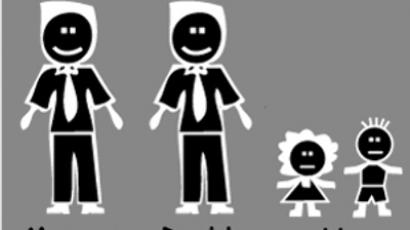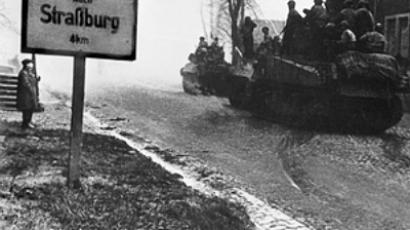Treading a fine line with at-risk UK kids
With 10,000 children in care of the UK government, taking kids from their parents is seen as a last resort. But some British families have been torn apart by social workers who remove children over minor domestic issues.
A woman jailed for waving to her children across the street; a mother in court over sending her eight-year old son a birthday card. These may sound like surreal soundbites from a totalitarian state, but actually they are headlines from the UK.
Christopher Booker is an investigative journalist who has looked into what he calls “forced adoption”.
“I had a case the other day where a mother was about to deliver her child in a hospital, and five policemen and two social workers came into the delivery room to seize that child – five policemen! With a mother who is helpless lying there giving birth to her baby. I mean, you can’t believe such things are happening. And when you read these things or hear them first hand, it does seem extraordinary. A little island of totalitarianism in modern Britain,” Booker says.
The Fowler family is now a happy one, but it was once torn apart, and anger remains at the actions of Social Services. Little Constancia’s elder sister was taken into state care aged just four months, and social workers wanted to take Constancia too – at birth.
“I did think my daughter would come back to us after a time, but she ended up being put up for adoption about 3 years ago. It’s your word against mine, so they rely on experts. My daughter was about to come back to us, when a psychologist came forward and diagnosed us as paranoid, depressed, and used the term ‘remote’, and on the basis of that, it was harder to get my daughter back,” father John Fowler says.
Although that diagnosis was refuted by other doctors, it took John Fowler five years to get his daughter back. She was taken on the basis of evidence from his 11-year-old stepson, who accused John and his wife of hitting their children – something they deny.
“I wouldn’t say I was a brilliant stepfather. There were problems in the house, but I wouldn’t say it merited taking my daughter into care and putting them into care themselves. I think the problems could have been addressed in a better way to what they were, you know? It’s like using a sledgehammer to break a walnut,” Fowler says.
There are around 60,000 children in care in the UK – 0.5 per cent of the total child population. Christopher Booker says there are hundreds, possibly thousands, of cases a year in which children are wrongly taken, and he is suspicious about the motives.“There’s a very considerable amount of money to be made – if you’re an adoptive parent and you take in one of these children, or a foster career, you can get 400 pounds a week for each child, which, if you have 2 or 3 adoptive children, is a hell of a lot of money. So the whole thing has become a very nasty, inhuman racket,” Booker says.
At the other end of the spectrum, there are shocking stories of abuse and neglect, such as the infamous “Baby P” scandal. In that case, social workers failed to remove a toddler from his parents, who ultimately tortured him to death.
A British Association of Social Workers manager, Nushra Mansuri, says it is a fine balance and that the goal is to keep families together wherever possible.
“This is going to be a debate that goes on and on and on, that we’re too accommodating for parents who have difficulties in caring for their children or that we’re overzealous and we’re taking these children swiftly and place them for adoption, and those are two extremes. And of course it’s not – it’s somewhere in the middle of that, where you make fine, fine judgments and they are hard to make, especially if they are borderline,” Mansuri says.
It is a process that is shrouded in secrecy by the law, and Social Services refuse to discuss individual cases. But they do say that once a child is in care, the priority is to have them adopted as soon as possible. That emphasis led to John Fowler’s daughter being advertised for adoption in a local newspaper – a practice that has become commonplace.
John Fowler’s story has a happy ending. He got his elder daughter back, although she is still under surveillance by the social services, and fought to keep baby Constancia. For some children, being adopted represents a chance for a better life. But there are other families who claim they are torn apart by the social services without good reason. They say it is a life-changing injustice.














